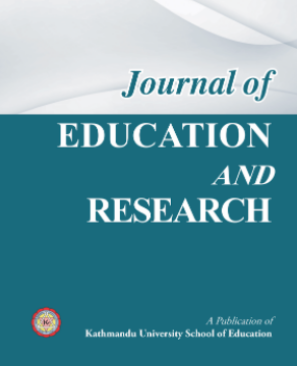
Student Cabinet and Curricular Activities: A Case Study of a Secondary School in Bangladesh
Original Article
Journal of Education and Research, Volume 10, Issue 2, 2020, 7-26, https://doi.org/10.3126/jer.v10i2.32718
Publication date: Nov 11, 2020
Views: 608 | Downloads: 265
How to cite this article
APA
In-text citation: (Roy, 2020)
Reference: Roy, S. (2020). Student Cabinet and Curricular Activities: A Case Study of a Secondary School in Bangladesh. Journal of Education and Research, 10(2), 7-26. https://doi.org/10.3126/jer.v10i2.32718
Reference: Roy, S. (2020). Student Cabinet and Curricular Activities: A Case Study of a Secondary School in Bangladesh. Journal of Education and Research, 10(2), 7-26. https://doi.org/10.3126/jer.v10i2.32718
Vancouver
In-text citation: (1), (2), (3), etc.
Reference: Roy S. Student Cabinet and Curricular Activities: A Case Study of a Secondary School in Bangladesh. Journal of Education and Research. 2020;10(2):7-26. https://doi.org/10.3126/jer.v10i2.32718
Reference: Roy S. Student Cabinet and Curricular Activities: A Case Study of a Secondary School in Bangladesh. Journal of Education and Research. 2020;10(2):7-26. https://doi.org/10.3126/jer.v10i2.32718
AMA
In-text citation: (1), (2), (3), etc.
Reference: Roy S. Student Cabinet and Curricular Activities: A Case Study of a Secondary School in Bangladesh. Journal of Education and Research. 2020;10(2), 7-26. https://doi.org/10.3126/jer.v10i2.32718
Reference: Roy S. Student Cabinet and Curricular Activities: A Case Study of a Secondary School in Bangladesh. Journal of Education and Research. 2020;10(2), 7-26. https://doi.org/10.3126/jer.v10i2.32718
Chicago
In-text citation: (Roy, 2020)
Reference: Roy, Sodip. "Student Cabinet and Curricular Activities: A Case Study of a Secondary School in Bangladesh". Journal of Education and Research 2020 10 no. 2 (2020): 7-26. https://doi.org/10.3126/jer.v10i2.32718
Reference: Roy, Sodip. "Student Cabinet and Curricular Activities: A Case Study of a Secondary School in Bangladesh". Journal of Education and Research 2020 10 no. 2 (2020): 7-26. https://doi.org/10.3126/jer.v10i2.32718
Harvard
In-text citation: (Roy, 2020)
Reference: Roy, S. (2020). Student Cabinet and Curricular Activities: A Case Study of a Secondary School in Bangladesh. Journal of Education and Research, 10(2), pp. 7-26. https://doi.org/10.3126/jer.v10i2.32718
Reference: Roy, S. (2020). Student Cabinet and Curricular Activities: A Case Study of a Secondary School in Bangladesh. Journal of Education and Research, 10(2), pp. 7-26. https://doi.org/10.3126/jer.v10i2.32718
MLA
In-text citation: (Roy, 2020)
Reference: Roy, Sodip "Student Cabinet and Curricular Activities: A Case Study of a Secondary School in Bangladesh". Journal of Education and Research, vol. 10, no. 2, 2020, pp. 7-26. https://doi.org/10.3126/jer.v10i2.32718
Reference: Roy, Sodip "Student Cabinet and Curricular Activities: A Case Study of a Secondary School in Bangladesh". Journal of Education and Research, vol. 10, no. 2, 2020, pp. 7-26. https://doi.org/10.3126/jer.v10i2.32718
ABSTRACT
Student leadership is well-known for enhancing student engagement in extra-curricular activities of the schools. But very little research has been pursued- particularly in Bangladesh on how the student leadership contributes to curricular activities and improves better learning experiences of students in secondary schools. In 2015, the Government of Bangladesh introduced Student Cabinet in the secondary schools with a view to inculcate democratic values among the pupils and to foster learning environment in schools. And, in this study, I examine how the Student Cabinet as a leadership tool influences academic activities: classroom and non-classroom activities and supports for an effective learning atmosphere in the school. To that purpose, I follow the qualitative methodology of in-depth interview, focus group discussion, and observation of the student cabinet’s actions in a selected school in Dhaka city. After an examination of its activities, the study reveals that it promotes many curricular activities of the school and minimizes the gaps of learning experiences at least a bit; however, their several activities are likely to link to traditional student politics in Bangladesh in future.
REFERENCES
---
LICENSE
This work is licensed under a Creative Commons Attribution 4.0 International License.
